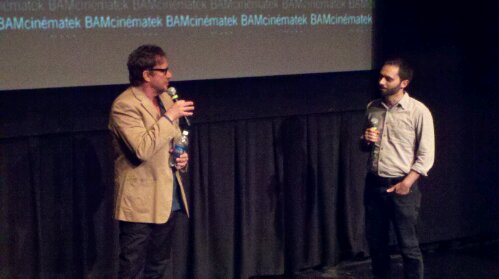
At a screening of Robert Bresson’s 1977 film The Devil, Probably, part of BAM’s series Bresson, Richard Hell brought both his punk lineage and his knowledge of film history to open a discussion of the film. Yet Hell wasn’t simply there to extol the virtues of The Devil, Probably; instead, his take on the film was an unorthodox one, both laudatory and — at times — brutally honest about its flaws. For a film with a focus on uncomfortable moments of veracity, it seemed an entirely appropriate approach.
After a short introduction by Jon Dieringer of Screen Slate, Hell took the stage. Dresssed in a blazer and a loose shirt, Hell looked like a charming and vaguely disreputable professor; his introduction directly addressed his own role in the film’s continued presence in repertory theaters, via his very memorable quote regarding the film — i.e. that it’s “by far the most punk film ever made.”
“I don’t have any really privileged information on this movie,” Hell commented, but his discussion of his own advocacy on behalf of the film was an interesting perspective on its own. He spoke of his first time seeing the film (in 1999), and how its treatment of suicide and its issues with both authority and protest movements mirrored Hell’s own feelings in the mid-to-late 1970s. Hell commented that the film “embodied my consciousness better than my own works.” And yet he was also honest in the section that concluded the introduction, commenting that upon watching the film again, he noted the awkwardness of Bresson’s preferred approach to filmmaking, later calling it “perversely clumsy” during the Q & A that followed the film. (This, he argued, helped to feed the film’s pursuit of truth.)
As for the film itself, I’d prefer to be minimal in my description: I knew almost nothing about it going in, and that served me well. I will say that its opening moments display two contradictory headlines giving accounts of a character’s death, and that much of the film can be spent attempting to reconcile the discrepancies between these two accounts. The tension between the desire to rebel and the excesses of rebellion — essentially, the tendency of some to lose sight of humanity while attempting to act on its behalf.
Dieringer and Hell handled a short Q & A after the film had ended. One audience member asked Hell if he thought that his 1977 self would have appreciated Bresson’s film had he seen it around the time of its release. Hell replied without hesitation that his younger self would not have, lacking the necessary background and sophistication to admire it. Another question asked whether Hell found the death at the center of the film tragic.
“I find it thrilling,” Hell replied. And with that, the event came to an end.
Follow Vol. 1 Brooklyn on Twitter, Facebook, Google + and our Tumblr.

1 comment